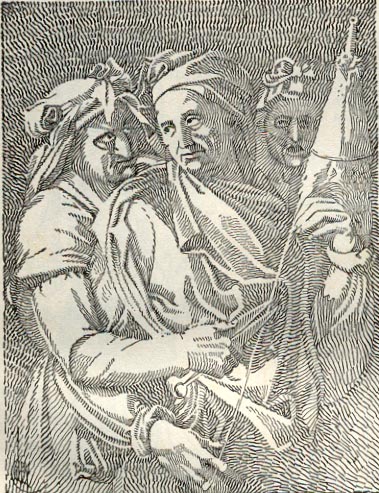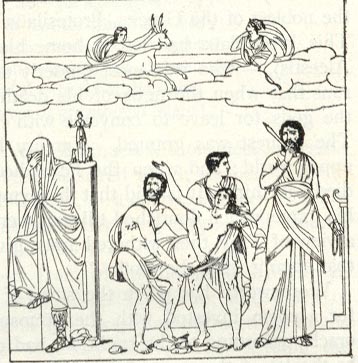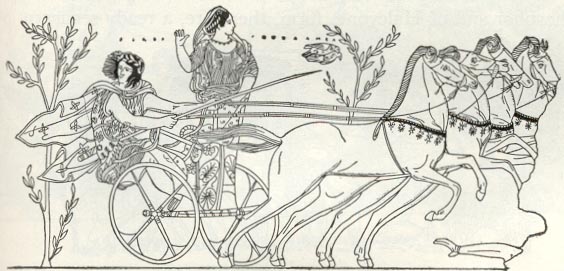Masterpieces of Western Literature
| Unit 1 |
|
English 201:
Masterpieces of Western Literature |
| .Unit 1 Reading | Course Reading | Entry Page |
| Introduction | Background | .Explication | Questions | Review |
Background:
Greek Concepts:
 |
Fate. In addition to generic or universal stages of human growth & development (logos), each person also has a particular mixture of propensities & talents that are fated to be worked out in a particular culture & in a particular stage of that culture. The illustration of the 3 Fates is from a painting by Michelangelo. The 3 Fates emerge out of the shadows (of the unconscious). One spins your destiny, another measures the length of your life, & the third snips the thread of the life that you are destined to have. |
The Atreidai:
Imagine the situation with Helen as a debutante. All the eligible
aristocratic bachelors show up at her dad's house. Whoever he might
choose as the husband for his daughter will inevitably end up dead before
he is married, so that one of the rest of us will have a chance to get
Helen. So he makes all the bachelors sign an agreement pledging that
they will respect the process & fight anyone who abducts Helen from
her rightful husband. Who does he choose for Helen's husband?
The rich guy, Menelaos.
Naturally Aphrodite can ignore human rules. She
gives Helen to Paris. Menelaos would have little chance of getting
her back except for the fact that his brother, Agamemnon, has military
ambitions. He assembles an army. The officer corps is composed
of all the former suitors to Helen.
Innocence:So the army is sitting in Aulis grudgingly ready to get someone else's wife back & the wind won't blow.
 |
Kalkhus, the diviner, explains that they must do something to indicate that they are seriously committed. The nominal goal of the exercise is to rescue beauty, but Helen is not some wispy girl. She is, as I said earlier, a match for Akhilleus; a woman who is a masterful game player & dominates in every relationship. Aeschylus & Sophocles illustrate the notion that "we suffer into wisdom." The equation in The Iliad is that power is bought at the price of innocence. The illustration for this is Agamemnon's (hereafter AG) willingness to sacrifice his virginal daughter, Iphigeneia. This sounds so barbaric that we need to better consider AG's motives. |
Real Life:Our
text says the Greeks were realists. We do not want to die, but there
is no way to evade it. We may hope to renounce violence, but we know
that this is not possible in the world we live in. Moreover, the
figure of Paris (who is content to dream in his bedroom) is contemptible.
The paradox is that the gods trouble those whom they love. If we
could evade fate & get what we wanted, wouldn't we each choose what
Paris did? A life of pleasure, luxury & no trouble. If
we were able to do this, we would not have a real life, we would spend
our time dreaming. No one would choose trouble (odium / Odysseus),
but because we endure trouble & struggle to overcome it, we achieve
an identity. We become, as Jesse Jackson says, somebody.
In the Greek view, death meant the loss of the body.
Even if one retained a mind & memories, the afterlife seemed bleak
& boring. One could not eat, drink, wrestle, fight, make love,
or even simply feel alive. Since this fate is unavoidable, we should
prepare for it by spending the limited time we have daring to be great,
performing actions that we will be proud to remember. We will consider
this paradox again several times in Homer's work.

Pelops wins the race against Elis.
The prize is Hippodamia who is looking on.
The house of Atreus produces the brothers Agamemnon & Menalaos; & their half-brother Agisthos. Here is part of the family geneology:
Zeus
|
Tantalus
|
Pelops = Hippodamia
|
_____________________
|
|
Atreus = Aerope
Thyestes
|
|
|
Agamemnon = Klytemnestra Menalaos =Helen
Agisthos (KLY)
|
|
_________________________
|
|
|
|
|
|
Iphigeneia Elektra Chrysothemis Orestes
Herminone =
Click on the next section: Explication
above.